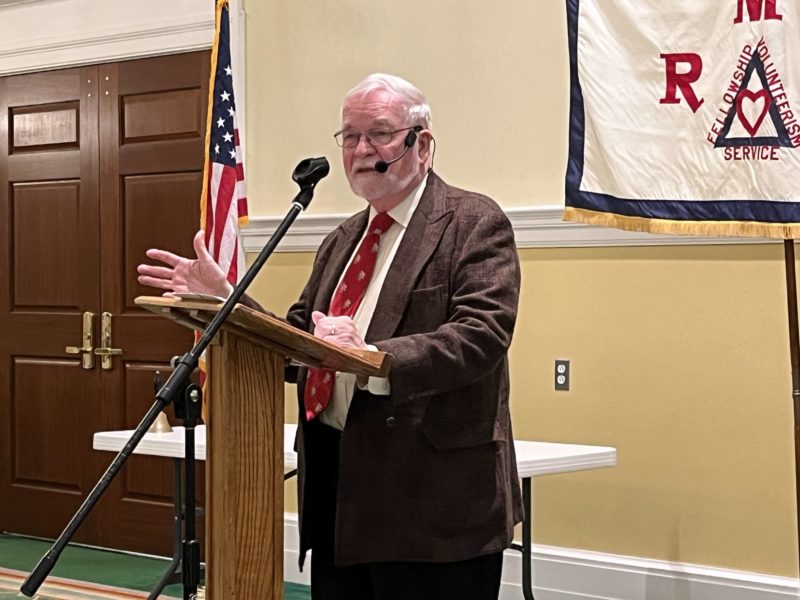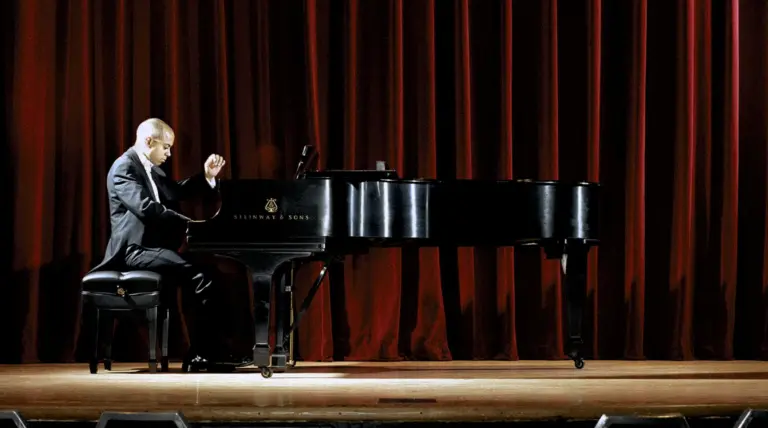
By Bob Giaquinto
At the March 27th meeting of the Greenwich Retired Men’s Association Bob Rimmer introduced speaker David Alan Richards, Yale graduate, Yale Law School graduate, and an RMA member. David captivated his audience with a riveting account of the quest by wealthy American collectors to acquire copies of Shakespeare’s First Folio in the early 20th century. The First Folio was published in 1623. Shakespeare died April 23, 1616.
With details pulled from deep scholarly research, David painted the First Folio as a true literary treasure. Out of the original print run of around 750 copies, only 233 are recorded as extant today. Over half reside in just four cities – Washington D.C., London, Tokyo, and New York. A startling 90% are institutionally owned, leaving precious few in private hands over time. There are a few copies at Yale, New York Public Library and one at Windsor Castle in England.
The lecture brought to life two real-life protagonists who emerged as the foremost American hunters of these “Stradivarii of books.” First was Alexander Smith Cochrane, the fabulously wealthy heir to America’s largest carpet company fortune. His grandfather founded the Alexander Smith Carpet Company. As a Yale student enthralled by Professor William Lyon Phelps’ class on Elizabethan drama, Cochrane’s quest began with an 1898 purchase from the renowned London bookseller Quaritch. However, Cochrane’s greatest coup was his 1919 acquisition of the entire Shakespearean collection held by English bibliophile Alfred Huth. In a dramatic pre-emptive strike, Cochrane secretly paid the staggering sum of $180,000 (over $4.5 million today) to secure Huth’s holding of 42 prized quartos before it could even go to auction. As Richards recounted with memorable phrasing, this “mercurial but fabulously wealthy” collector secured the trove with a coded telegram to Yale’s librarian simply stating: “Have secured entire Huth Sale Shakespeares.”
While Cochrane soon lost his ardor for book collecting, becoming more enthralled by “racy females” like a Polish opera singer, his legacy was enshrined in Yale’s Elizabethan Club. Its vault contained his bounty, including 40 prized quarto editions that Richards listed in comprehensive dramatic fashion.
The lecture’s other central figure was Standard Oil president, and later chairman, Henry Clay Folger 1857-1930. He was the nephew of the founder of Folgers Coffee. What began with an 1889 acquisition of a humble fourth folio for $107.50 grew into an all-consuming obsession. Folger became renowned for his “particular centripetal collecting energy”, pushing him to amass 82 First Folios over time. No expense was too lavish for Folger to pursue his quixotic goal of recovering “Shakespeare’s original intentions and language.” A 1920 purchase of Baroness Burdett Coutts’ First Folio for $52,070 set a new world record. David recounted Folger’s humorous exchange with John D. Rockefeller, who questioned whether he had truly spent $101,000 on some books, to which Folger wryly played down the “exaggerated” amount. Folger’s relentless quest culminated in the creation of the Folger Shakespeare Library in Washington D.C., funded by his vast fortune. The library became home to the world’s largest collection, including those 82 First Folios carefully shelved.
While celebrating these two “white whales” of the collecting world, David educated his audience on the literary importance of the First Folio. It preserved the complete texts of 18 plays, half of Shakespeare’s entire canon, some of which would have otherwise been lost forever. He cited how one prized 1679 quarto edition of Titus Andronicus exists in a single surviving copy worldwide.
Richards closed by bringing the First Folio’s value full circle to the present day. He shared specifics on escalating prices at auction, including a 2020 sale that hammered at nearly $10 million. With copies still being discovered in attics and private holdings, the global mania for obtaining this “greatest contribution to secular literature” shows no sign of abating soon. The presentation ended with an informative question & answer period.
The talk can be viewed by going to the RMA website at https://greenwichrma.org, and clicking on “Speakers.”
The RMA’s upcoming presentation, “When Science Goes Wrong: The Desire and Search for Truth,” by Br. Guy Consolmagno SJ, is scheduled for 11 AM on Wednesday, April 10, 2024. When we think that following science is a sure way to get to all the right answers, we misunderstand the nature and history of science; it can only get closer to the truth by recognizing where and how it has gone wrong. Even Galileo’s revolution in science included some truly bizarre ideas of what the Earth looked like and how (and why) it was situated in the heavens. What can this tell us as we grapple today with dark matter and dark energy… and about the nature of the search for Truth itself? In this presentation Brother Guy Consolmagno SJ, the Director of the Vatican Observatory, will discuss his latest book, When Science Goes Wrong: The Desire and Search For Truth.
A native of Detroit, Michigan, Br. Guy earned undergraduate and masters’ degrees from MIT, and a Ph.D. in Planetary Science from the University of Arizona. He was a postdoctoral research fellow at Harvard and MIT, served in the US Peace Corps (Kenya), and taught university physics at Lafayette College before entering the Jesuits in 1989.
At the Vatican Observatory since 1993, in 2015 Pope Francis appointed Dr. Consolmagno director of the Vatican Observatory. Br. Guy’s research explores connections between meteorites, asteroids, and the evolution of small solar system bodies. He has observed Kuiper Belt objects with the Vatican’s 1.8 meter telescope in Arizona, and measured meteorite physical properties to understand asteroid origins and structure. Along with more than 250 scientific publications, he is the author of a number of popular books including Turn Left at Orion (with Dan Davis), and Would You Baptize an Extraterrestial? (with Paul Mueller). In 2000, the IAU named asteroid 4597 Consolmagno in recognition of his work. In 2014 he received the Carl Sagan Medal for excellence in public communication in planetary sciences. He currently serves as chair of the IAU Mars Nomenclature Task Group and vice president of the Meteoritical Society.
To stream the presentation by Dr. Consolmagno at 11 AM on Wednesday, April 10, click on https://bit.ly/30IBj21. This presentation will also be available on local public access TV channels, Verizon FIOS channel 24 and Optimum (Cablevision) channel 79.
Note: The views expressed in these presentations are those of the speakers. They are not intended to represent the views of the RMA or its members.
RMA speaker presentations are presented as a community service at no cost to in-person or Zoom attendees, regardless of gender. Any member of the public who would like to receive a weekly email announcement of future speakers should send a request to members@greenwichrma.org. The RMA urges all eligible individuals to consider becoming a member of our great organization, and thereby enjoy all the available fellowship, volunteer, and community service opportunities which the RMA offers to its members. For further information, go to https://greenwichrma.org/, or contact members@greenwichrma.org.



